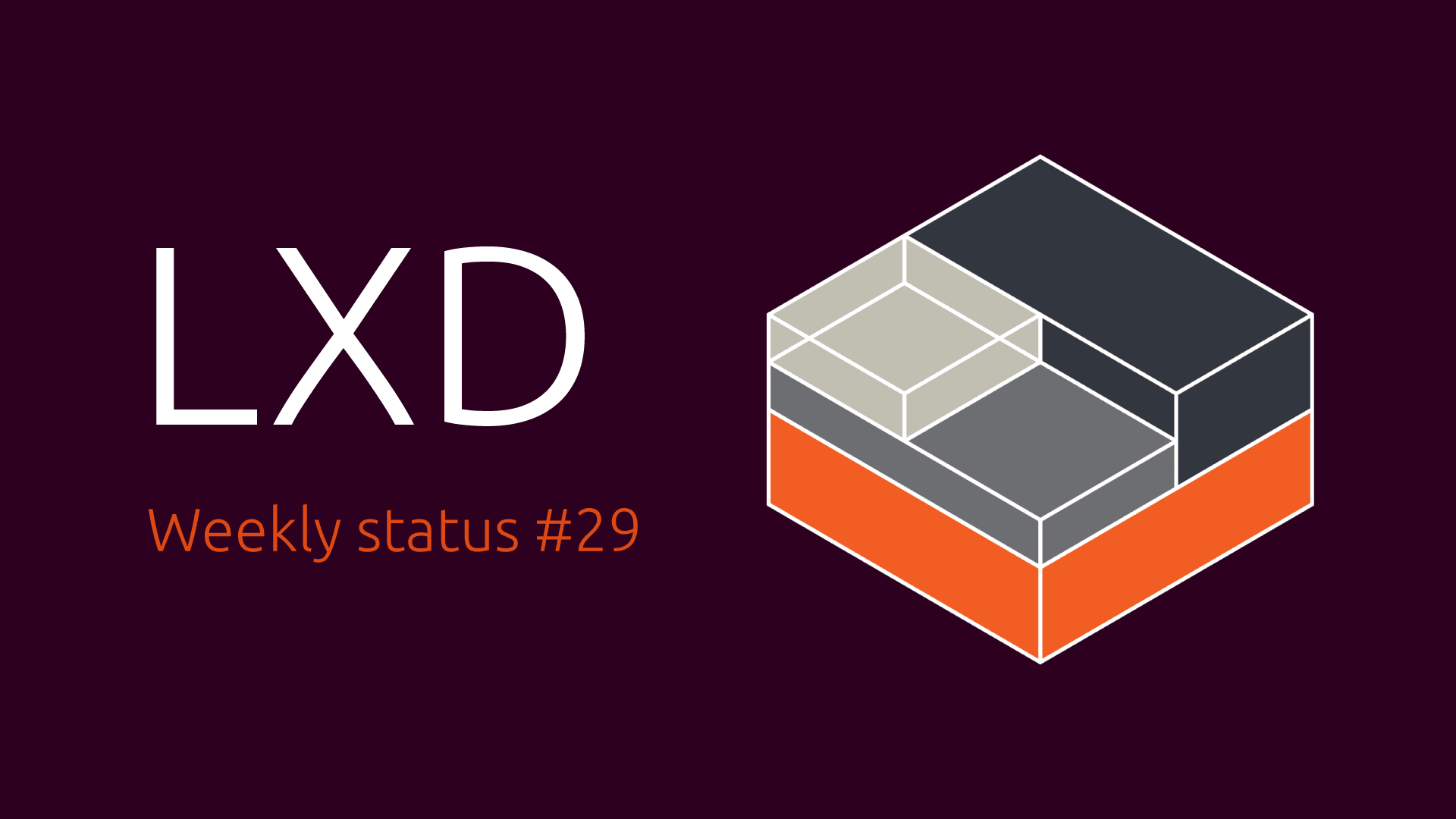LXD weekly status #29
Stéphane Graber
on 8 January 2018

Introduction
And we’re back from the holidays!
This “weekly” summary is covering everything that happened the past 3 weeks.
The big highlight was the release of LXD 2.21 on the 19th of December.
During the holidays, we merged quite a number of bugfixes and smaller features in LXC and LXD with the bigger feature development only resuming now.
The end of year was also the deadline for our users to migrate off of the LXD PPAs.
Those have now been fully deleted and users looking for newer builds of LXD should use the official basckport packages or the LXD snap.
Upcoming conferences and events
- FOSDEM 2018 (Brussels, February 2018)
Ongoing projects
The list below is feature or refactoring work which will span several weeks/months and can’t be tied directly to a single Github issue or pull request.
- New “proxy” device type for network forwarding in LXD
- Distributed database for LXD clustering
- Stable release work for LXC, LXCFS and LXD
Upstream changes
The items listed below are highlights of the work which happened upstream over the past week and which will be included in the next release.
LXD
- Added integration with MAAS (IP management & DNS).
- Fixed a typo in the
lxc exechelp. - Added a /1.0/events endpoint to the /dev/lxd API.
- Fixed support for devices containing a slash in their names.
- Tweaked the initial
run lxd initmessage. - Updated the Github issue template.
- Fixed btrfs UUID handling.
- Added some missing endpoints to the API documentation.
- Added checks to prevent slashes in snapshot names and storage pool and volume names.
- Tweaked
lxd initto strip leading and trailing spaces from user input. - Updated the documentation to cover CPU limits.
- Fixed version detection logic in console logic.
- Added a new
processescolumn tolxc list. - Fixed a bug causing the
descriptionfield of containers to be dropped when they are restarted. - Removed LXD PPA handling code from the vagrant scripts.
LXC
- Improved the DHCP client hook for OCI containers.
- Added a new mount hook to configure access to NVidia GPUs.
- Tweaked some logic in container startup.
- Simplified the container attach logic significantly.
- Fixed up bad error handling during monitor connection.
- Fixed a small issue with mount entries parsing.
- Fixed unprivileged snapshot creation on btrfs.
- Updated the Japanese translations of lxc.container.conf.
- Added new logging macros for the Cgroup code.
- Simplified the cgroup namespace preservation code.
- Fixed the startup death signal handling.
- Added logic to capture the output of short lived init processes.
- Added -h and –help to lxc-config.
- Removed the set_running_config_item API (never released).
- Added support for containers that don’t have a root mapping.
- Added logic to set setgroups to “deny” for fully unprivileged containers.
- Fixed the Gentoo template to handle .tar.xz tarballs.
- Fixed the configure.ac check for static libcap.
- Tweaked lxc_get_version to suffix the version string with “-devel” when running git.
- Added a return check to lxc_cmd_get_name.
- Fixed the exit status of lxc-usernsexec.
LXCFS
- Nothing to report
Distribution work
This section is used to track the work done in downstream Linux distributions to ship the latest LXC, LXD and LXCFS as well as work to get various software to work properly inside containers.
Ubuntu
- Uploaded LXD 2.21 to Ubuntu 18.04.
- Backported LXD 2.21 to Ubuntu 16.04, 17.04 and 17.10.
- Uploaded some bugfixes on top of LXD 2.21 to Ubuntu 18.04 and backported to 16.04, 17.04 and 17.10.
Snap
- Updated to LXD 2.21
- Fixed a bug related to LD_LIBRARY_PATH handling on Debian
- Cherry-picked a number of upstream bugfixes
Talk to us today
Interested in running Ubuntu in your organisation?
Newsletter signup
Related posts
What is RDMA?
Modern data centres are hitting a wall that faster CPUs alone cannot fix. As workloads scale out and latency budgets shrink, the impact of moving data between...
Building new revenue streams: 3 strategic cloud opportunities for telcos in 2026
PWC claimed the ‘fundamental challenge’ behind slowing growth is that telecom’s ‘core products and services’ are ‘becoming commodities.’ The way forward lies...
SQL Server 2025 is generally available on Ubuntu 24.04 LTS
Microsoft has announced the General Availability of SQL Server 2025 on Ubuntu 24.04 LTS. Learn about the new CU1 features, including OS-level observability,...
